Journey into the Heart of Danger: A Jewish Traveler's Tales from Taliban Territory
Benny Wexler has traveled to over a hundred countries, but his visits to hostile Islamic nations will never fade from memory. "Taliban soldiers patrolled back and forth," he recalls.
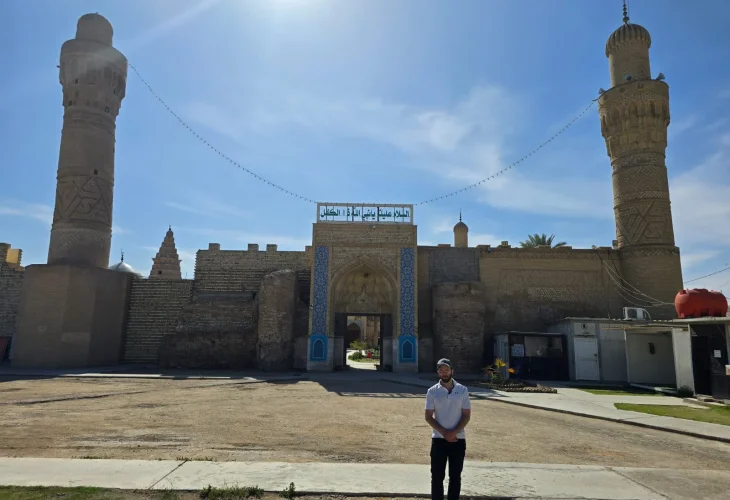 Wexler near the Tomb of Ezekiel the Prophet in Iraq
Wexler near the Tomb of Ezekiel the Prophet in IraqIt was late at night. The streets were silent and still, shrouded in complete darkness. Only the green lights of a nearby mosque blinked in the sky, and the glowing crescent atop the minaret pierced the bleak darkness.
In the sole guesthouse in Afghanistan, Benny Wexler lay awake, trying to fall asleep. Occasionally, he glanced out the window at the building across, which housed the Iranian Embassy. He replayed in his mind the tense encounter he had earlier that day with Taliban leaders: climbing the winding stairs of Taliban government offices, catching his breath, and suddenly finding himself facing senior officials who scrutinized him with penetrating gazes. Despite the hostile stares, he drifted into a swift slumber.
Dawn was breaking over Kabul, Afghanistan's capital. The sky was still dark, the streets remained empty, and only the cries of "Allahu Akbar" began to shatter the silence. Wexler awoke quickly, peering anxiously through the curtains as Taliban members flocked in droves to the well-known Imam Ali mosque.
In the Arms of the Taliban
Benny Wexler's story, an Orthodox Jewish Israeli and American travel agent, is among the bravest tales a traveler can offer. Wexler is a wandering Jew who has visited over a hundred countries worldwide, including third-world countries. But his most daring adventures took place in hostile Islamic nations: Afghanistan, the Taliban stronghold; and Iraq, ruled by the ruthless dictator Saddam Hussein.
Wexler arrived in Afghanistan about six months ago. "I knew before going in that I wouldn't have any protection or security," he recalls in an interview. "But after conquering most European countries, I was looking for a more challenging trip, and Afghanistan is definitely a challenging destination. It's a dangerous journey in every respect, and I knew if something happened to me—there'd be no one to protect or secure me."
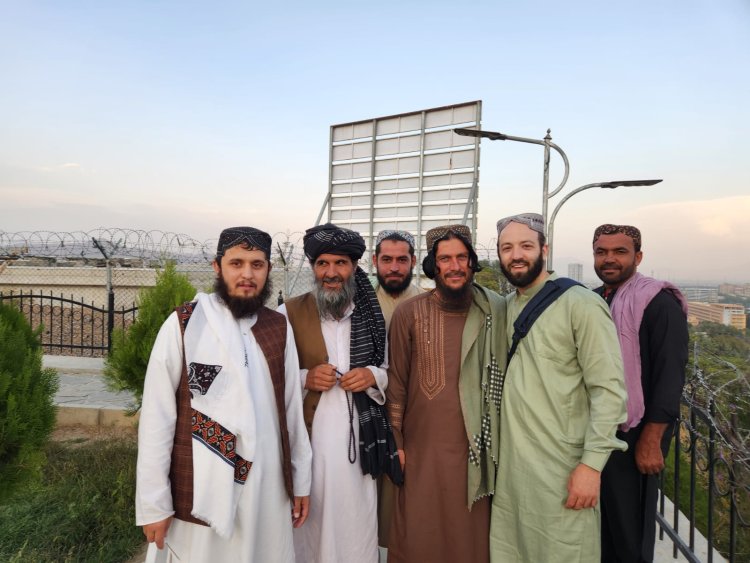 With locals in Kabul
With locals in KabulDescribe the moment you first landed in Afghanistan.
"A very frightening moment. The international airport was full of Taliban members, standing at every corner with long guns. Afghanistan is not a tourist destination at all, and few travelers visit it. For this reason, whenever a tourist arrives, the Taliban detain them and conduct lengthy inspections. It's a real fear."
After a particularly suspicious series of security checks, Wexler quickly crossed the airport and headed for the central boulevard of Kabul, the capital city. "Throughout Afghanistan, there's not a single hotel," he describes. "There is one simple and old guesthouse where I rented a small room."
To travel in Afghanistan, Wexler needed special permission from the Taliban. As soon as he arrived at the guesthouse and handed over his suitcase, he went to request the permit at government offices. "It's a tall and old office building, surrounded by tight security," he says. "On the first floor, I faced clerks who conducted a preliminary interrogation. On each floor I ascended, I underwent additional questioning regarding the purpose of my visit. I continued climbing the stairs, and when I reached the top floor, I found myself standing before Taliban leaders who scrutinized me with their piercing gazes."
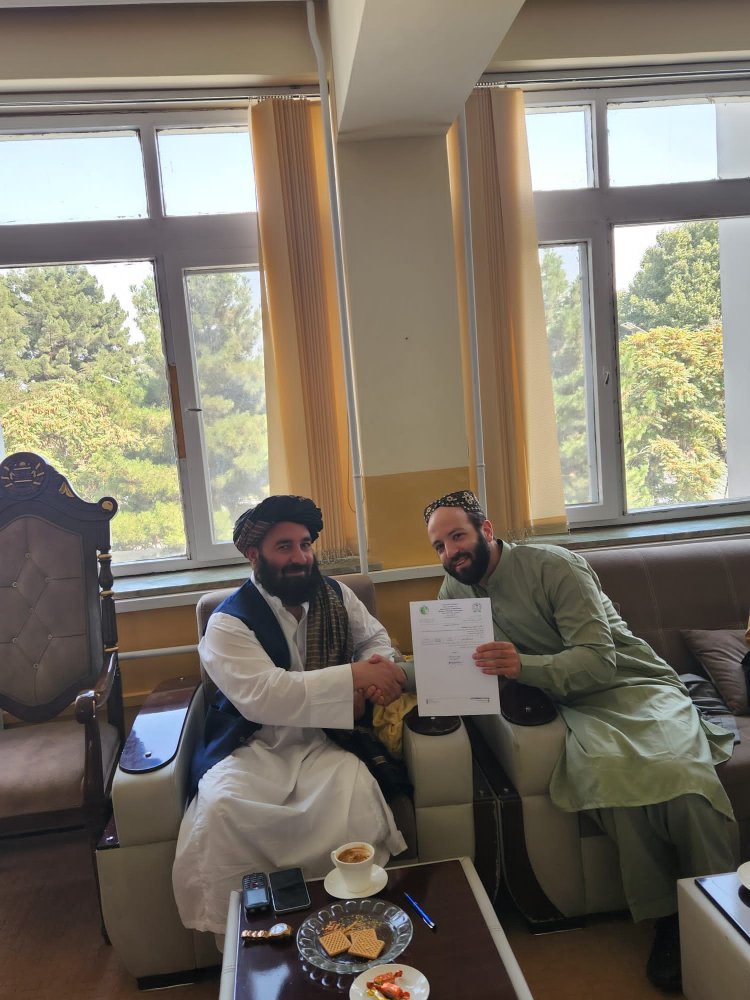 Permission from the Taliban to travel in Afghanistan
Permission from the Taliban to travel in AfghanistanDid they know you were Jewish?
"Of course not," Wexler says horrified. "If they knew I was Jewish, they would have killed me on the spot. Not even a hint of my Jewish identity was mentioned on the American visa with which I entered Afghanistan."
Wexler spent three days in the state of the Taliban. He visited local museums and a mosque built as a replica of the Al-Aqsa Mosque on the Temple Mount. He searched for Jewish symbols in the country but found almost none. "I found only one synagogue, referred to by locals as 'the Jewish mosque,' but the Taliban had, of course, shut it down."
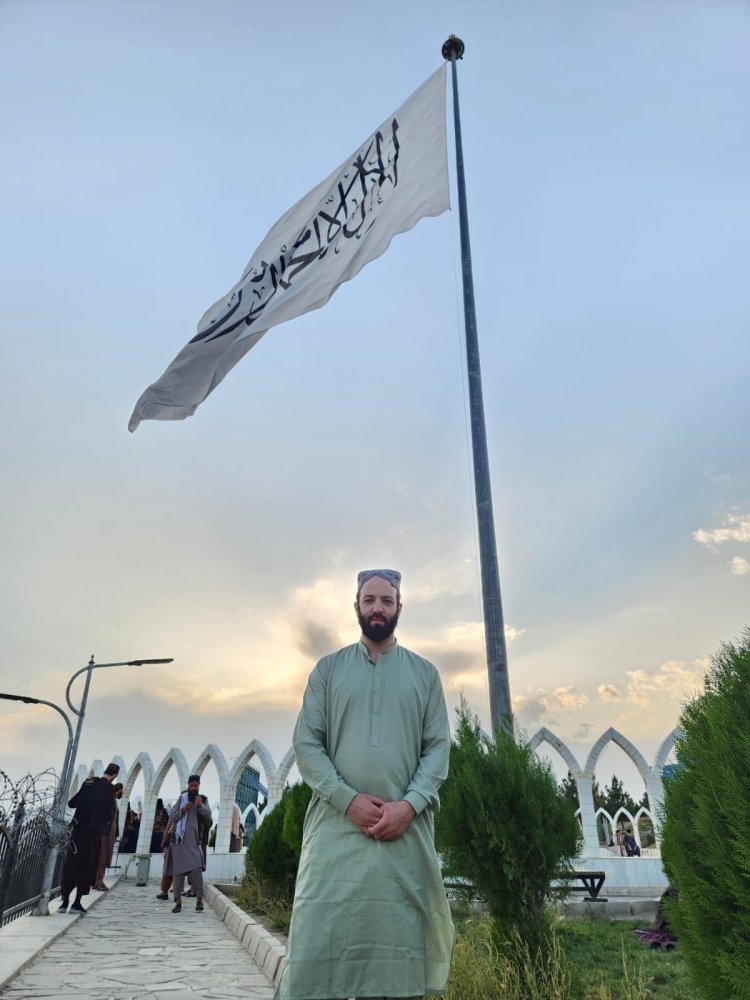 Wexler in the streets of Afghanistan, with the Taliban flag in the background
Wexler in the streets of Afghanistan, with the Taliban flag in the backgroundHe describes the streets of Afghanistan as ghost streets. "Fear dominates every corner, and the residents themselves are engulfed in immense fear. Women do not go out on the street, and Taliban members patrol back and forth with drawn weapons to ensure this. The terrible fear is indescribable. It's clear to me that Afghanistan's residents have become miserable since the Taliban seized power."
In Saddam Hussein's Palace
During his daring journeys, Wexler also visited Iraq. "The first time I arrived was two years ago," he recounts. "I visited again two weeks ago."
Wexler describes life in Iraq as strange: "On one hand, extreme poverty prevails, but on the other, there are residents with substantial wealth. This contrast is striking: On one side of the road, you can see small, old, rundown houses, and on the opposite side, stylish, luxurious homes."
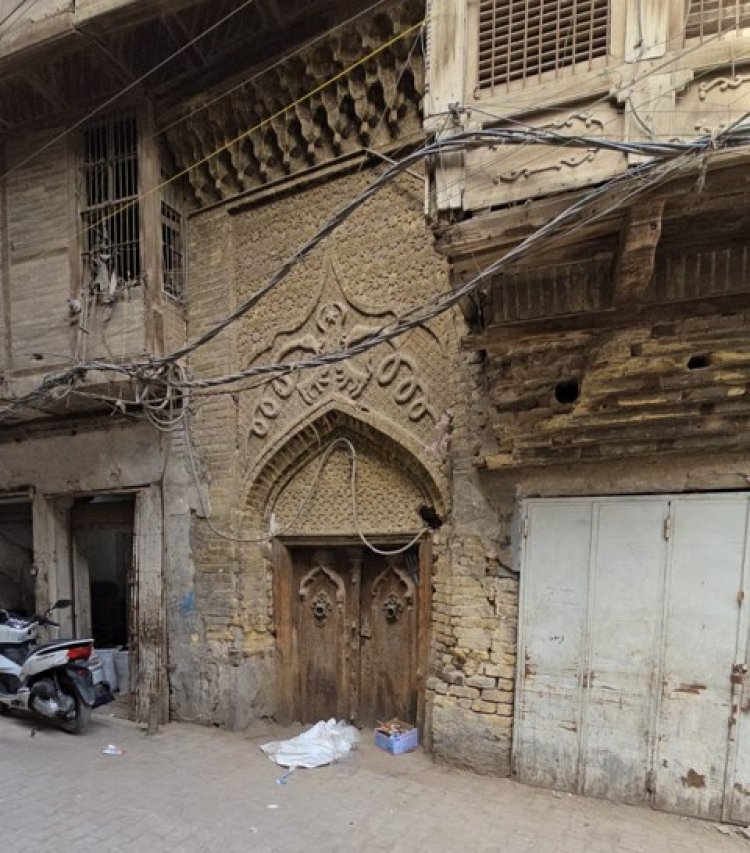 Synagogue where the Ben Ish Chai prayed
Synagogue where the Ben Ish Chai prayed"The markets in Baghdad are very picturesque," he continues to describe. "It's as if the rich Jewish history that once flourished here lingers in the air. In fact, the Jewish history of Iraq echoes from every corner: The Talmudic cities mentioned in the Babylonian Talmud and the rivers of Babylon mentioned in the prophets' books still exist. Walking through the alleys, I felt a surge of emotion at the thought that Talmudic sages walked here 1,500 years ago."
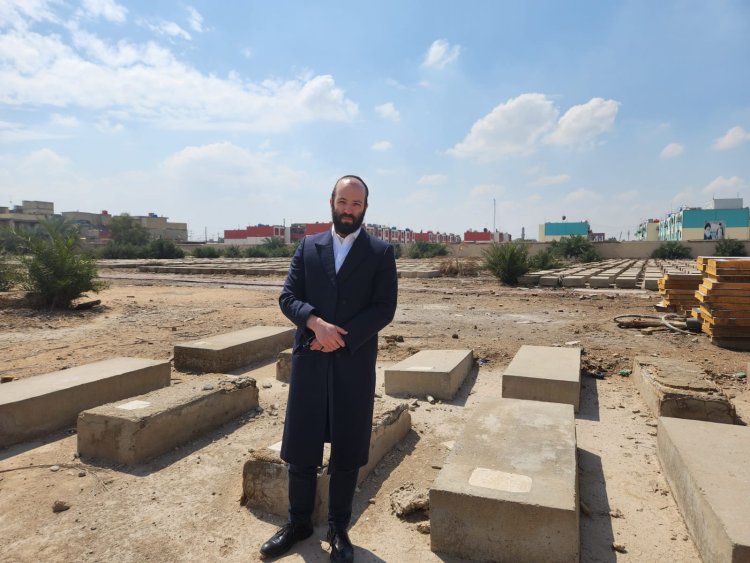 At the Jewish cemetery in Baghdad
At the Jewish cemetery in BaghdadOne of the most moving stops Wexler visited was Baghdad's only surviving synagogue, "Meir Tweig," located in the Al-Batawin district in the city's east. From there, he continued his journey to the Tomb of Ezekiel the Prophet and the Tomb of Job, which have been transformed into local mosques. "Inside the tombs themselves, Hebrew inscriptions bear silent testimony to a vanished Jewish life," he says with sorrow. "Until five years ago, the extremist terrorist organization ISIS controlled the area, and it's a wonder they didn't destroy these holy sites."
During his journey, Wexler reached the Ishtar Gate, one of the main gates of ancient Babylon. The gate, known as "the Blue Gate," stands at the main entrance to Babylon, leading to the street called by locals as "Babylon's Parade Street." According to Wexler, "This street was where Nebuchadnezzar II, destroyer of the First Temple, led parades to his palace nearby. The palace still stands, and the lion statue placed by Nebuchadnezzar near his palace still exists today."
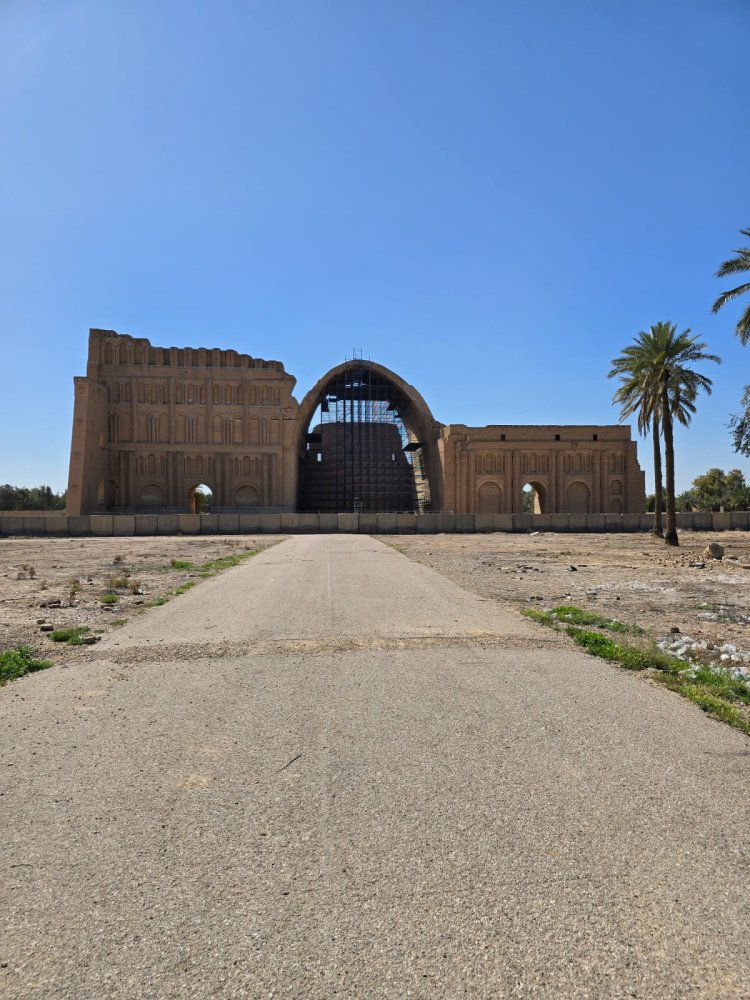 Nebuchadnezzar II's palace
Nebuchadnezzar II's palaceAn opulent palace of Saddam Hussein was built adjacent to the Ishtar Gate. "The palace is tall and magnificent," says Wexler. "It was built in a stunning location—situated atop the Babylonian Gate area. From there, one can view the entire picturesque and ancient landscape and the flow of the Babylonian rivers encircling Iraq."
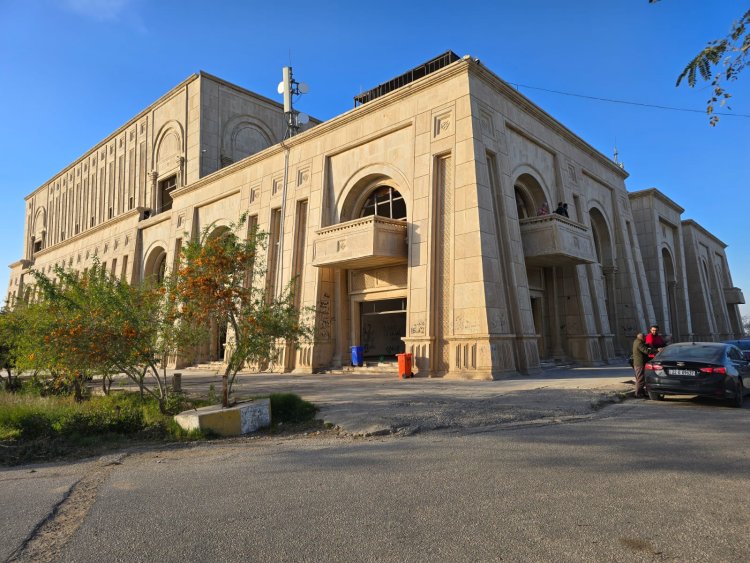 Saddam Hussein's palace
Saddam Hussein's palaceWexler notes that behind the picturesque and pastoral atmosphere of Iraq lurk deadly dangers: "Local militias control much of Iraq, and I was careful to avoid encountering them. These militias are dangerous, and their soldiers are extremely ruthless." He adds that during his last visit to the country, he noticed street signs expressing support for Hamas leader Yahya Sinwar and Hezbollah leader Hassan Nasrallah, both of whom were eliminated by Israel.
In Third World Countries
During his travels, Wexler crossed continents. About six months ago, he visited Bangladesh in South Asia, which he calls "the poorest country I've ever seen in my life." He describes the shock of seeing the filth dominating the streets and the slow movement of locals using old, dilapidated 'tuk-tuk' vehicles.
His visit to Sudan in Africa exposed him to similar experiences: "The poverty there is insane and extreme. The streets are neglected, and a stench of filth prevails. I also visited the only Jewish cemetery in the country, and it was sad to witness its neglect."
Finally, share a dramatic story from your travels.
"The scariest incident happened as I was leaving Afghanistan. I passed my suitcase through security before boarding the flight when the Taliban men suddenly stopped me and asked to personally inspect it. Inside the suitcase were my tallit and tefillin, and I realized that if they discovered them—my life would be over. I had to find a creative solution swiftly. Then, with Hashem's help, a brilliant idea struck me.
"I looked into the Taliban men's eyes and started shouting loudly, 'I am American, and in America, they speak badly about you. They say you commit crimes against humanity. But now, after visiting you, I understand how wrong America is. You are good, not evil. You are good.' They looked at me in complete shock, and I saw how moved they were by my words. And thus, under the cover of their disbelief, I closed the suitcase and quickly slipped onto the flight."

